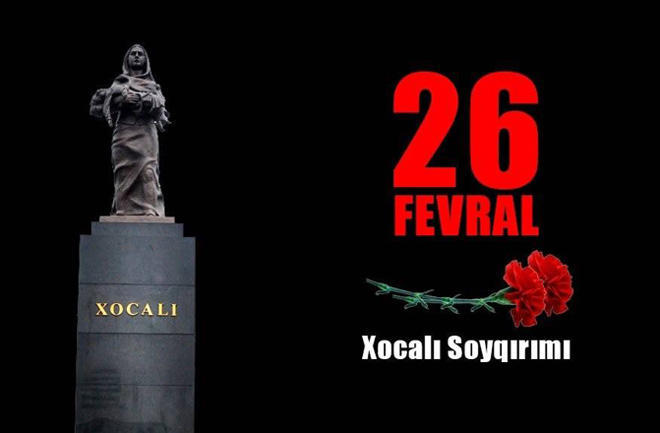Indonesian parliament group urges punishment for Khojaly genocide culprits

By Vafa Ismayilova
An Indonesian parliamentary group has issued a statement, urging punishment for culprits of the 1992 Khojaly genocide committed by Armenians during the Nagorno-Karabakh war, the Azerbaijani embassy in Indonesia has reported.
The statement was issued by the head of the Azerbaijan-Indonesia interparliamentary friendship group in the country's House of Representatives, Mohammad Igbal, on behalf of the group to mark the genocide's 29th anniversary, the report added.
The statement reminded the killing of 613 civilians, including 63 children, 106 women and 70 old people in the Azerbaijani town of Khojaly on the night of February 25 to 26, 1992, during the First Karabakh War. It said that hundreds of people were seriously injured, and 1,275 residents were taken hostage.
The document stressed that the persons who committed the crimes must be brought to responsibility.
The Khojaly massacre, also known as the Khojaly tragedy, was the mass murder of ethnic Azerbaijani civilians by the Armenian armed forces and the 366th CIS regiment in the town of Khojaly in Nagorno-Karabakh on 26 February 1992 during the First Karabakh War.
The Nagorno-Karabakh conflict broke out after the rise of anti-Azerbaijan sentiments in Armenia in 1988 due to Yerevan's illegal claims to Azerbaijan's internationally-recognized Nagorno-Karabakh region.
Following the Soviet Union’s dissolution in 1991, Armenia waged a total war against Azerbaijan through armed attacks on the Nagorno-Karabakh region. The war lasted until a ceasefire in 1994. Some 30,000 Azerbaijanis are reported to be killed in the first Karabakh war. Armenia's forces displaced one million throughout the hostilities, while forcibly occupied 20 percent of Azerbaijan’s internationally recognized territories – the Nagorno-Karabakh region and seven surrounding districts. For nearly three decades, Armenia failed to implement the UN Security Council resolutions (822, 853, 874 and 884) demanding the immediate and unconditional withdrawal of its troops, which was the main obstacle to the resolution of the conflict.
The war resumed on September 27 following the artillery shelling of Azerbaijani military positions and civilian settlements by Armenia's forces deployed in the occupied lands of Azerbaijan.
The trilateral peace deal signed by the Azerbaijani, Russian and Armenian leaders on November 10, 2020, ended the 30-year-old conflict between Baku and Yerevan over Azerbaijan’s Nagorno-Karabakh region that along with the seven adjacent regions came under the occupation of Armenian armed forces in the war in the 1990s.
On January 11, 2021, the Azerbaijani, Russian and Armenian leaders signed the second statement since the end of the 44-day war. The newly-signed statement is set to implement clause 9 of the November 2020 statement related to the unblocking of all economic and transport communications in the region.
--
Follow us on Twitter @AzerNewsAz
Here we are to serve you with news right now. It does not cost much, but worth your attention.
Choose to support open, independent, quality journalism and subscribe on a monthly basis.
By subscribing to our online newspaper, you can have full digital access to all news, analysis, and much more.
You can also follow AzerNEWS on Twitter @AzerNewsAz or Facebook @AzerNewsNewspaper
Thank you!
